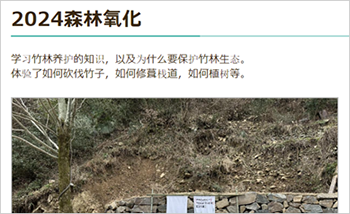We will strive to reduce GHG emissions by providing green products and innovating in our business processes in order to fulfill our corporate mission to control global warming as per the Sustainability Policy. Having declared support for the TCFD Recommendations, we will proactively continue to clarify risks and opportunities associated with climate change and implement information disclosure.
Approach to Climate Change
Based on "The Advantest Way," Advantest continuously engages in
long-term initiatives to alleviate and adapt to climate change in
order to contribute to tackling important social challenges related to
environmental issues.
For
disclosures related to climate change based on the TCFD
Recommendations, please refer to "Risk Management" on the "Governance" page.
International initiatives and Advantest’s efforts on climate change
As a mid/long-term climate change countermeasures target, Advantest has set a goal to reach net-zero Scope 1+2 GHG emissions by FY2050. In addition, we have set targets to reduce Scope 1+2 GHG emissions by 65% by FY2026 compared to FY2018.
Furthermore, Advantest has established Scope 3 GHG emissions reduction targets for FY 2030. However, in light of changes in the business environment, we are currently reviewing our Scope 3 targets and considering specific measures to achieve these targets.
Initiatives Through Industry Groups
Japan Climate Initiative
Japan Climate Initiative (JCI) is a network of non-state actors who
make serious efforts towards the 1.5-degrees Celsius target and the
realization of a decarbonized society.
Advantest supports the declaration of the JCI, "Joining the front line
of the global push for decarbonization from Japan," and participated
in the initiative to support the transition to a decarbonized society
by 2050.
We will contribute to the realization of a decarbonized society by
voluntarily and proactively taking actions on climate change and by
working together with local governments and private companies, which
are actively engaged in climate change countermeasures.
Semiconductor Climate Consortium
The Semiconductor Climate Consortium (SCC) is a consortium established by the Semiconductor Equipment and Materials International (SEMI) to speed industry value chain efforts to reduce greenhouse gas emissions from the semiconductor ecosystem. Advantest joined the SCC, as one of the founding members, bolstering climate change measures along with member companies to achieve the 1.5-degrees Celsius target.

Environmental Management
Advantest has formulated the Sustainability Action Plan 2024-2026 to aim for the sustainability of the company and society through the enhancement of sustainability initiatives. The action plan's specific targets and indicator settings are based on international standards, such as those for climate change countermeasures. The results are reported to and discussed with the Sustainable Management Promotion Working Group twice a year. The Working Group will then report them to the Executive Management Committee and the Board of Directors in accordance with the Sustainability Policy, and discussed as part of our sustainability strategy. We use the ISO14001 management system as a tool to track our progress toward these goals.
For more information on international standards for climate change countermeasures, please refer to "Approach to Climate Change".
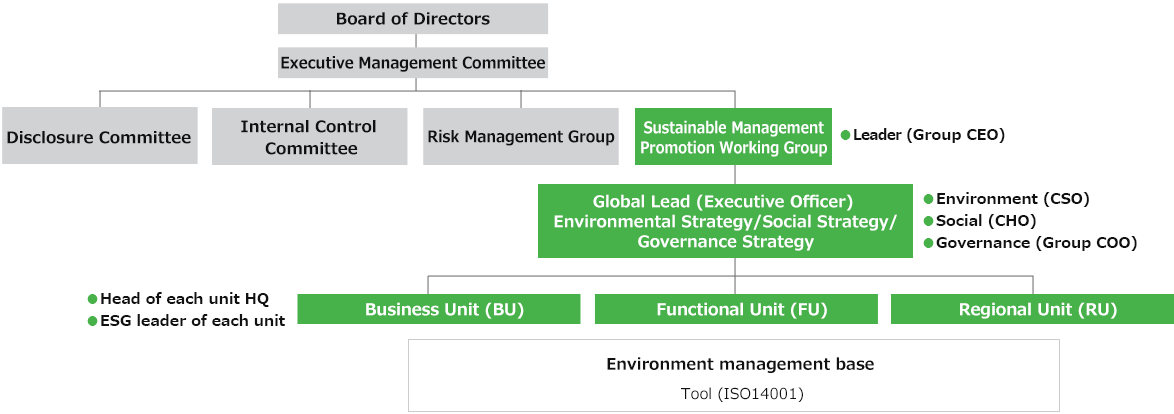
Acquisition of ISO14001 Certification
The Advantest Group has acquired the integrated ISO14001 certification for its offices, as well as its research, development, and production facilities in Japan. The Group has acquired ISO14001:2015 certification for its environmental management system, which is based on relevant laws and regulations in each country where it operates. Under the uniform standards provided by ISO14001:2015, we are promoting initiatives to reduce energy use, control waste generation, develop and provide environmentally friendly products (green products), and reduce the environmental impact of our business activities.
ISO14001 as an important management tool that serves as a driving axis for our sustainability initiatives and a cycle for checking its progress. We intend to maximize its use as an international standard that can be widely utilized in Japan and our overseas locations.
Acquisition of ISO14001 certification

As of June 10, 2025
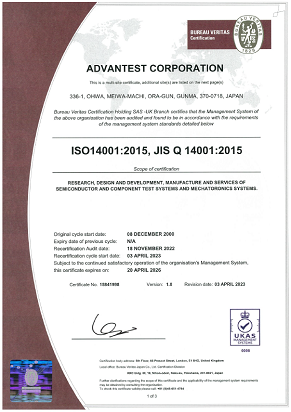
Advantest Corporation ISO14001 certifications scope
As of June 10, 2025
Addition of S (Social) and G (Governance) targets to ISO14001 Management Targets
At the 2022 ESG Global Meeting, a measure to achieve the ESG Action Plan (at that time) using the ISO14001 Management Program mechanism was proposed, given that ISO14001 is an existing mechanism involving the PDCA cycle and has already been in operation at major sites. We decided to expand the scope of management not only for E (Environment) but also to S (Social) and G (Governance)(*). Taking this opportunity, the scope of management by ISO14001 has expanded to the U.S. and Japan as we make maximum use of ISO14001 management targets to enhance our sustainability initiatives.
-
*S and G targets are not subject to ISO14001:2015 certification audit.
Expansion to Overseas Sites
In 2023, Advantest America, Inc. (AAI) updated its ISO14001 program and integrated it into its ESG program. At the same time, AAI expanded the scope of application of ISO14001 to all its manufacturing locations, and these locations have launched environmental initiatives.
In addition, we incorporated the flow of strengthening sustainability initiatives and activities utilizing the ISO 14001 program into our environmental education for fiscal 2024 and communicated this globally.
Adoption of ISO14001 in Japan
In expanding the scope of ISO14001management program to ESG, we have devised a method for setting our goals. While environmental target themes are attributed to "Significant Environmental Aspects," S and G target themes are attributed to higher-level targets.
We have also improved the process so that the ESG action plan (at that time) at the corporate level is firmly incorporated into unit strategies at the unit level and management programs at the division level.
Specifically, starting in 2023, outside experts and ESG leaders from the Sustainable Management Promotion Working Group (SMWG) were added as members of the joint goal-setting meetings to discuss and agree on targets. Those meetings, which had become mere formalities, were transformed into a forum of communication, and in fiscal 2025, 77.9% of all ESG management program department targets were attributed to higher-level targets.
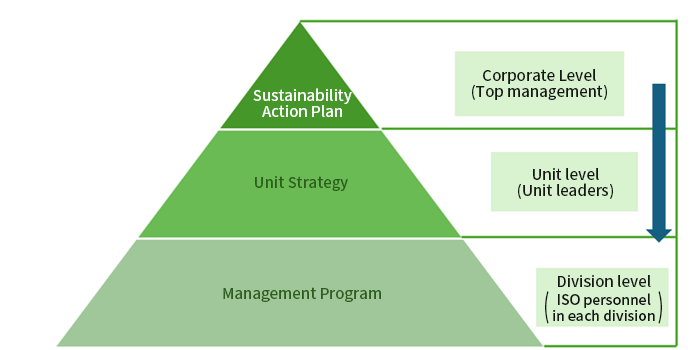
Examples of Targets and their Attributed Strategies
Environmental Policy Based on ISO14001 Standard Requirements
Advantest has established our environmental policies as an entire group and promotes environmental conservation in view of realizing a sustainable society. Based on the Sustainability Policy, Advantest continuously makes efforts to set long-term goals for environmental priority issues through our business. We have clarified KPIs for the three-year period of our third mid-term management plan (MTP3) (2024 to 2026), with the goal of contributing to the climate change mitigation and a decarbonized society.
Please refer to "Materiality and ESG Action Plan" for the Sustainability Action Plan.
Environmental policies of the Advantest Group
The Advantest Group contributes to the sustainable development of
society through our business activities.
Moreover, we are committed to protecting the environment through
climate change countermeasures, preservation of biological diversity,
etc. as well as ensuring sustainable use of energy, water resources,
etc. All our employees actively engage in the following environmental
conservation activities so that our company can earn the trust of
society.
-
1.Promoting Environmental Management
By maintaining our environmental management system, we promote global environmental conservation efforts that achieve a balance between business activities and environmental concerns. -
2.Reduction of Customers' Environmental Burden
We promote energy conservation, improved recyclability, and the elimination of hazardous substances to provide environmentally friendly products and services that contribute to our customers' reduction of their environmental burdens while considering the life cycle of our products from material procurement to waste disposal. -
3.Better Workplace Procedures
We reform work procedures to continually improve our environmental performance by creating environmentally friendly products. -
4.Environmental Protection and Sustainable Use of Resources
By being alert to the environmental impact of our business activities, we strive to protect the environment from measures against climate change to the conservation of biodiversity, as well as sustainable use of resources such as energy and water. -
5.Complying with Environmental Laws and Regulations and Preventing
Pollution Upholding all environmental laws and regulations and voluntary standards, we protect nature and shield our neighbors from environmental pollution and health hazards caused by chemical substances, waste and other contaminations.
Revision of the Environmental Policy
The Group CEO shows his firm commitment to the Advantest Group Environmental Policy.
In addition, the policy is reviewed when any of the following events occur, and in principle, the details of the changes are deliberated and decided by the Executive Management Committee before being disclosed internally and externally.
-
When there is a significant change in the environmental impact of our products, activities, or services
-
When the ISO 14001 standard is revised and differences from the requirements of the standard arise
-
When there is a change of the Group CEO
Sustainability Education
In Advantest, education is being addressed within the larger framework of Sustainability promotion as well as the environment since 2022.
Basic Stance on Sustainability Education
The Advantest Group believes that it is essential for our employees to understand social issues in view of realizing a sustainable society. We promote global awareness-raising activities while holding the following two matters in mind.
-
1.Each and every employee needs to always feel that social issues are close to their heart; and
-
2.Think about what they can and should do both at work and in the home, and transform these ideas into action.
In fiscal 2024, the Advantest Group addressed “1”by providing environmental education on environmental contribution through our business activities, and “2” by using our in-house social networking platform, "My LIFE. ON.", for sharing individual employees’ efforts, and by holding sustainability workshops to promote sustainability awareness among employees.
Major Environmental Education Programs
We use the ISO14001 standard to promote our efforts to reduce the environmental impact. For details on ISO14001, please refer to "Environmental Management".
Participation in General Environmental Education for fiscal 2024
| Target employees | Number of participants | Participation ratio (%) | |
|---|---|---|---|
| Japan | 2,918 | 2,918 | 100 |
| Overseas | 4,915 | 4,505 | 91.7 |
| Overall | 7,833 | 7,423 | 95.9 |
Other Sustainability Educational Activities
Discolsure of Sustainability Related Materials
The following video and documents have been disclosed to promote a broad understanding of Advantest's sustainability activities in fiscal 2024 among all stakeholders, including employees. Both materials provide an easy-to-understand introduction to Advantest's sustainability initiatives.
These contents aim to provide a deeper understanding of Advantest's sustainability initiatives.
Sustainability Workshop
Advantest offers workshops for new employee training and for those who wish to learn about sustainability in a fun way. The workshop uses a card game* that allows participants to experience the connection between their actions and society and the improvement of their wellbeing through different ways of using money and activities based on diverse values.
This initiative contributes to the internalization of sustainability and the improvement of employee engagement.
Participants provided the following comments:
-
"It made me feel connected to society."
-
“It was the first step toward accepting diverse values.”
-
“I was able to experience how my actions affect society.”

-
*"from Me" is a hands-on card game created by the Japan Fundraising Association, a nonprofit.
Clarifying the Desired Impact
With the cooperation of Token Express Co., Ltd., we organized and designed our plan and roadmap for promoting sustainability activities within the company in fiscal 2024 based on the concept of impact. We will continue to actively promote sustainability within the company with the aim of achieving the visions we have established.

Usage of The Interactive Digital Globe
We purchased an interactive digital globe, that reflects real-time Earth data, and installed it in our Gunma R&D Center, our research and development base. This tool, which allows us to learn about global temperature changes and the past, present, and future of the Earth, is used to promote environmental education on a global scale.
We actively use the interactive globe for employee and supplier training. We also participate in local events to deepen people's understanding of sustainability through our interactive globes.
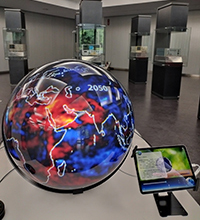
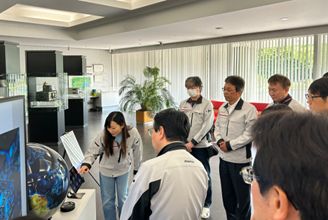
Online Earth Day Event in 2024
In the U.S., we hosted an online Earth Day event for our employees, as we did last year. The event provided a good opportunity for many employees to raise their awareness of environmental conservation, with the Marine Mammal Center, an NGO which rescues, researches, and conserves marine animals, introducing ocean conservation through marine animal rehabilitation, and the SEMI Climate Consortium explaining the semiconductor industry's environmental initiatives.

Global Educational Activities on Our Internal Social Networking Platform "My LIFE. ON."
The Advantest Group runs an internal social networking platform, "My LIFE. ON.". This social networking platform enables our employees to enjoy contributing to the SDGs by posting activities that are beneficial for people, the environment, and society and "liking" and commenting on each other's posts to demonstrate their support for such activities.
Establishment of a Global Promotion System
The Advantest Group has built a global system to encourage employee participation. Together with SDG promotion members at eight global locations, many employees use the in-house SNS as a place to introduce and share their activities in the community.
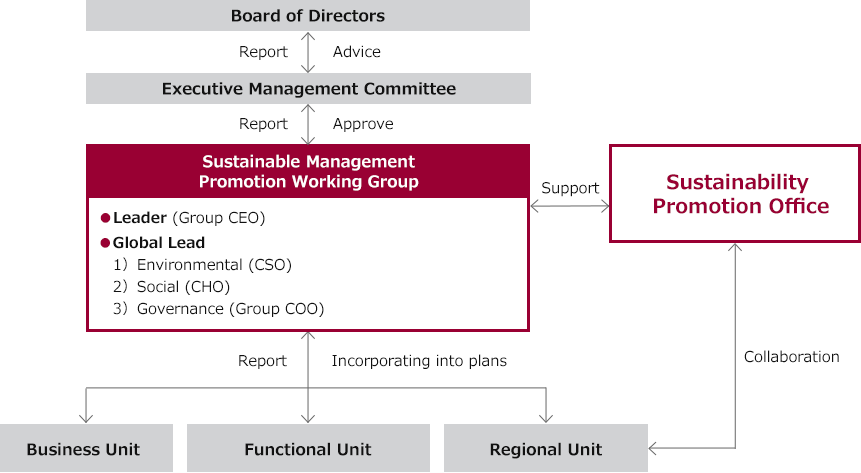
In fiscal 2024, employees worldwide continued to implement a variety of social contribution activities and shared them on My LIFE.ON.
We received many posts from our employees in China about their contributions for forest conservation. Japanese employees post in Japanese, while Chinese employees post in English and/or Chinese. My LIFE.ON. is a unique global exchange platform, which enables us to share information about our contribution activities in multiple languages.
Besides the above, other active contributions to society, such as one by an employee who participated in a hair donation program, donating her two-year long hair to help provide medical wigs to children experiencing hair loss due to illness, and another by an employee who achieved 100 blood donations, and receiving a commemorative gift from the Japanese Red Cross Society for his proud 100th milestone, were well received.
